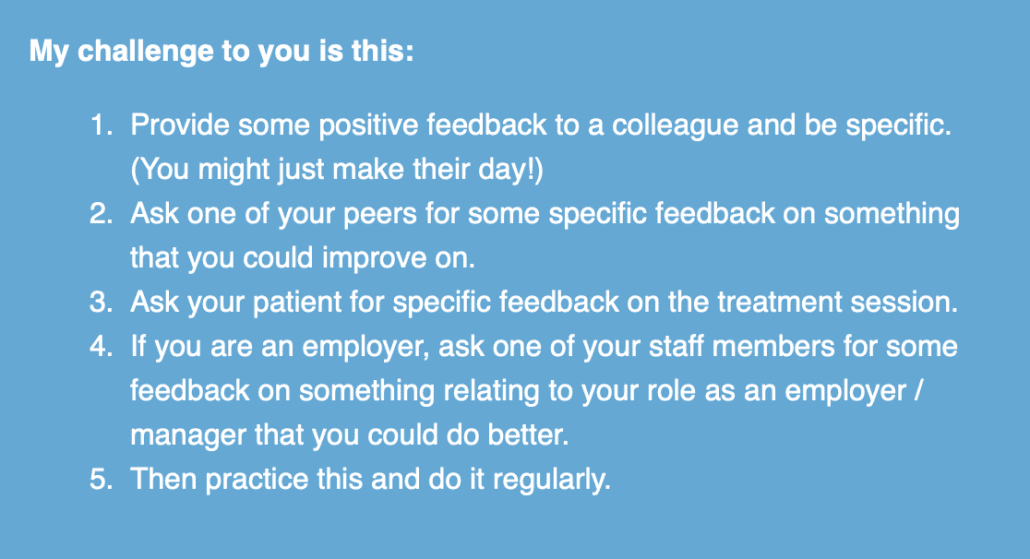Feedback
A very important but overlooked skill…
Feedback is what I am referring to. I believe that both giving and receiving feedback is a skill, and that skill takes practice. The word itself might increase anxiety levels when someone says “let me give you some feedback”, it might automatically put you on the defensive. However, the implications of giving and receiving feedback well, and using it to implement change can be astronomical.

Let’s be honest, we all like to hear good feedback, right? Its nice, it makes you feel all warm and fuzzy, it makes you feel appreciated, it shows you that the effort you are putting in is being noticed and appreciated. The psychological influences of feedback can go a long way towards improving motivation, improving productivity, and retaining staff.
Receiving feedback, both positive and constructive is helpful to our growth and development, But, giving feedback is not easy. It really is a skill.
I want you to think about how often you provide feedback to your staff.
And I am not just talking about a ‘good job’ here are there. I am talking about genuine feedback, good feedback and constructive feedback. Think about what that looks like, are you specific with the feedback? When feedback is provided do you also provide suggestions on how to improve? This is how we can grow and develop each other with constructive feedback and reward.
Our brains respond to reward, this triggers a dopamine response, and we are reward seeking creatures. If you don’t receive feedback there is low expectation of reward, therefore levels of motivation will be low. When we receive feedback after completing a task there is expectation of a reward so motivation levels are high also in anticipation of achieving the reward. It is also great, if you receive feedback without expecting it, the reward level can be much higher. This is a bit like finding a $20 note on the ground… it’s not life changing but it’s awesome and can make your day! And the opposite is also true, if there is feedback provided after everything you the level of reward is lower. This is like an overly enthusiastic personal trainer that says GOOOOD! After ever rep… you know the ones!
Now think about this, if you complete that task and you were expecting a reward and did not receive the expected reward, dopamine levels can plumet. This can clearly have negative consequences on mood, motivation, thoughts, and beliefs. This is a bit like ordering some clothes online from “Wish” that look awesome in the picture but when you open the package it looks like it was made by a 5-year-old… Dopamine levels crash through the floor.
Another example is a beautiful golden Labrador pup. The pup will be so highly motivated for reward, which is often food! We can get the dog to sit, stay, come when called with the use of a reward in the form of food, a big pat or some words of affirmation. However, if you take this reward away, the level of motivation will decline in the absence of the reward and the pup will lose interest.

So back to the human side of this, the implications of not providing feedback may lead to a loss of interest, heightened emotional arousal, anger, frustration, low self-worth low motivation, low levels of creativity and low confidence. If this compounds it can be detrimental to the business and the culture, environment, and level of satisfaction from both staff and employers.
Remember, Your staff are what makes your business thrive, without them, its just you.
What if we flip this around… Bosses and employers don’t often get told if they are doing a good job / bad job or areas that they can improve on and areas that they are doing a great in, so how do employers really know that what they are doing is the right thing? Much of it is guess work, experience, learning from mistakes etc. If you are an employer there is often no one to coach you, pick you up when you fall, or provide you with advice. So, you could assume you are doing the right thing and hope for the best, or you could ask for it.
Now it is not common for employees to provide feedback to their superiors actively. So, the only way for you to get it, is to ask for it.
Asking for feedback
This is the hardest challenge of all…
Asking for feedback is often far more honest and constructive. We as humans are lot more forthcoming with honest feedback if we are asked specifically, “Can you please give me your feedback on x”.
Constructive feedback is difficult to provide actively because we don’t know how it will be received or if they are receptive to hearing the feedback and taking the feedback onboard.
When feedback is not delivered right, it can be perceived as a threat to an employee/employer’s status or job role and therefore there is a defensive emotional response. It is then very difficult to take on this information and the person receiving the feedback will create a justification for the behaviour or action or create a counter argument. If feedback goes against our beliefs, it can be ignored or disregarded. Delivering feedback in a way that is receptive can be challenging but can promote improved work culture and job satisfaction.

Asking for feedback from others can normalise the relationship, it shifts the dynamic from boss and employee to two people in the same team working towards a common goal. Furthermore, it can improve openness, connectedness, and honesty.
Without this openness it can lead to supressing emotions which can be unhelpful and drive negative behaviours. Giving and receiving feedback can be a helpful way to combat this and improve workplace culture.
“Leaders determine the environment” Simon Sinek
Receiving constructive feedback
Equally as challenging is receiving constructive feedback.
Receiving feedback is also a skill. If someone is providing feedback, it is important not to get defensive. Do not come up with reasons, rationales, or justifications “I only do that because of this x reason”.
Take it on board. Because they wouldn’t tell you if they didn’t think it was relevant of valid.
If you are not receptive to feedback this can increase the friction of others providing you with feedback, and unfortunately no one benefits, and friction can increase over time.
If the feedback is not clear or you need more context, you can ask for an example from the person giving you feedback and also ask them for a suggestion of what to do about it.
And while I am writing this this, am certainly no expert in leadership, feedback, or the art of communication. I am reflecting on challenge that I also face providing feedback to others, and its mainly constructive feedback that is most difficult because getting the delivery right is crucial and also removing emotion and bias from the feedback is also important. For me to grow and develop, I rely on feedback from others, and for me to assist in the development of others, some people rely on my feedback also.
I am an employee, a manager of others, a teacher, a student, a mentor, a mentee, a clinician and sometimes a patient. To do well in all these roles we need to be able to give and receive feedback. But I am lucky to work alongside a very open team who are receptive to feedback with excellent lines of communication where feedback is shared regularly so we can all grow, learn, and overcome challenges together. In fact I have the opportunity to learn from a great leader at ACE who gives and receives feedback very well, along with deeply reflecting on feedback to come up with strategies and suggestion for improvement, therefore there are minimal barriers to sharing feedback.
Our role as mentors, leaders or employers is more than just leading from the top down, the best leaders will find ways to understand motivate and reward staff socially, emotionally, and psychologically on a regular basis through the power of communication.
Feedback can create a positive work environment can lead to the upregulation of pleasure chemicals such as norepinephrine, dopamine, and serotonin these pleasure chemicals can increase team performance and lead to positive changes in the brain. But as a leader, you wont always be loved for your feedback, sometimes firm feedback needs to be provided, but in the long-term it is valued and appreciated as this is the kind of feedback that helps us grow.
It is often easier to say nothing at all. But if you want to improve through feedback, you will have to ask for it. Constructive feedback is not easy, but it can be a valuable learning tool, both to give and receive.
Asking your patients/ clients for feedback
Now if you are a clinician. Have you ever asked your patient for feedback? And no not feedback that you can share on your social media or feedback in the form of a google review.
I am talking about at the end of the session, asking specifically, can you provide me some feedback on the way the session went today? Did the consultation align with your expectations? Where would you like to see next session progress to? Were you expecting to have some time allocated to exercise and manual therapy? How do you see future sessions progressing? Can you tell me if you think this session was helpful? Can you see any areas that we could improve on in the next session?
As the clinician, it is difficult to understand what the patient is thinking without asking them. This is no different to being an employer or an employee. How will you know what your staff / boss are thinking without asking them?

Good luck!
I am keen to hear your feedback on this email! Let me know how you go with 1 or more of the points listed above.
Bodine Ledden



